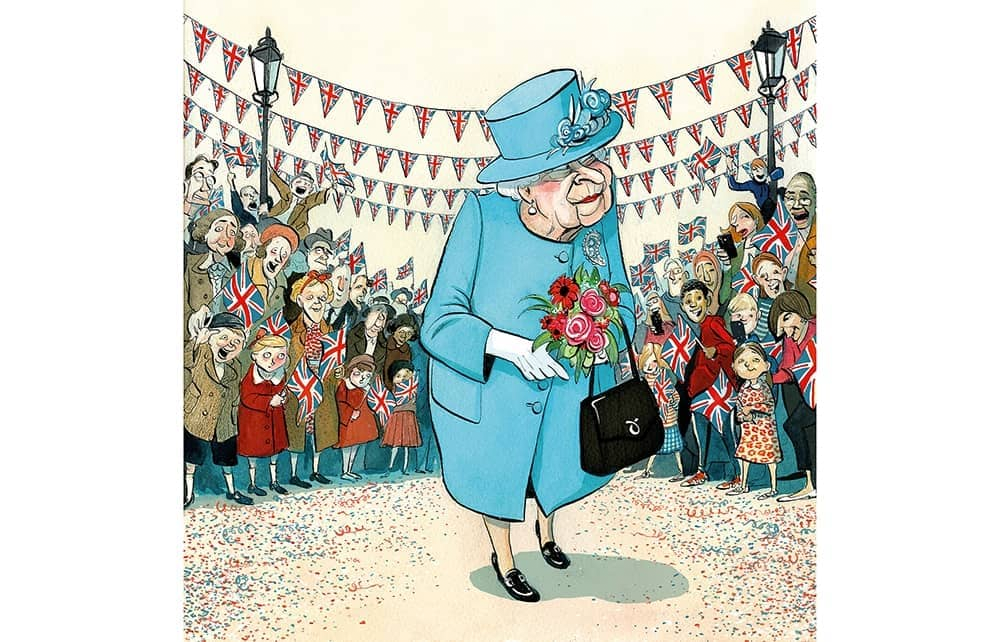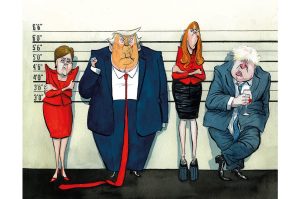Long before domestic woes and an inferno at Windsor had prompted Queen Elizabeth to describe 1992 as her “annus horribilis,” she had a very frank discussion with her prime minister, John Major. On this particular matter, she made it clear that she was not interested in ministerial advice. Her mind was made up. She had decided to pay income tax.
For the best part of two years, through war in the Gulf and a recession, sections of the British media had been painting a picture of a spoiled, profligate royal family carrying on without a care. Every long-range snap of a shooting party or of the Duchess of York on another holiday was taking its toll, and would be conflated with the issue of money. As her then press secretary Charles Anson told me: “Day after day, every other story would be followed up with: ‘What’s more, the Queen doesn’t pay tax.’”
The Queen felt impelled to act, even if her prime minister was not in favor of the idea. “The fact of the matter is we would not have required the queen to pay tax. I did not require the Queen to pay tax,” Sir John said when I discussed it with him years later.
Within the family, the Queen faced one formidable obstacle in her quest to reform the finances: the Queen Mother. It was George VI who had secured this tax break from Neville Chamberlain in the wake of the Abdication, when the new king faced a crippling bill to pay off his predecessor. Writing my new biography, Queen of Our Times: The Life of Elizabeth II, I discovered just how keenly George VI had impressed the importance of this deal upon his daughter. As her former private secretary, Sir William Heseltine, said: “Anything in the way of a dictum her father had left her was very important.”
So the fact that the Queen was suddenly tearing up this deal, against the wishes of her father, her mother and her prime minister, was extraordinary. Yet she asked her Lord Chamberlain, the Earl of Airlie, and his team to start talks with the Treasury.
The wisdom of that decision would become clear in November 1992 as the grandest parts of Windsor Castle lay in ashes after a builder’s lamp had set fire to a curtain. Much of the media had reacted angrily to the government’s suggestion that the state would fund the repairs. The following week, the Queen made her famous speech about her “annus horribilis.” Just two days later, Major stood before the House of Commons to announce that the monarch would now pay tax.
The Queen had planned to go public a few months later when it had all been finalized, but there was no time to lose. At the height of a crisis, the palace had been able to react swiftly and remove the principal stick with which to beat the monarchy.
It is unlikely that anyone will be dwelling on moments like these as the bunting goes up and the trestle tables groan beneath the weight of cake and sandwiches. The Platinum Jubilee is a moment to celebrate the extraordinary service of a monarch whose reign began in the age of ration books and steam trains; whose very first medal at her first investiture as Queen was the Victoria Cross she pinned on Private Bill Speakman-Pitt for heroism in the Korean War. This is the same Queen who, seven decades later, was holding Zoom calls with space scientists and meeting her fourteenth US president. As George W. Bush told me, it is highly unlikely that anyone else in history has known fourteen presidents.
In celebrating Her Majesty’s seventy years on the throne, we will be touched by footage of a young mother of two taking on the most glamorous but impossible job in the world at the age of twenty-five. Yet the enduring strength of the institution she leads, despite numerous challenges, is not just down to lucky genes and longevity. It is precisely because of her intuitive capacity to adapt, and her quiet insistence on following her own instincts, that the monarchy is as robust as it is today. Indeed, by the standards of her forebears, we can even call her a radical.
For, notwithstanding the declinist narrative of The Crown and the more disparaging commentators (a few days before the Queen overtook the reigning record of Queen Victoria, in 2015, the Guardian’s Polly Toynbee wrote that she was the “past-mistress of nothingness”), she has presided over monumental change. And she has not just been an interested bystander. She has been a player.
During the 1980s a series of internal reforms, driven by Lord Airlie, not only dragged the court from the Edwardian era into the present day but ensured that the monarchy’s operational budget remained the same for twenty years. The Queen studied and approved it all.
Or take one afternoon in 2011 when the monarchy underwent more constitutional upheaval in a single hour than in the previous hundred years. At a stroke, the governments of all her realms (sixteen at the time) would abolish the system of male primogeniture going back to time immemorial. They’d also overturn the 310-year-old rule that any member of the royal family marrying a Roman Catholic was debarred from the line of succession. Gone, too, was the 240-year-old rule requiring all lineal descendants of George II to seek regal approval before marrying (as a result of which the marriages of several distantly-related couples were, technically, invalid).
All these reforms were, of course, statutory issues for the prime ministers of the Queen’s realms. David Cameron and Australia’s Julia Gillard convened a special meeting for the whole lot — from Canada to tiny Tuvalu — in the margins of the 2011 Commonwealth summit in Perth. But, as I have discovered, the chief architect of those historic changes was the Queen’s then private secretary, Sir Christopher (now Lord) Geidt. It is inconceivable that Sir Christopher was acting independently of his boss. In other words, the Queen was well and truly in on it.
Over the previous thirty years, MPs and peers spanning all three main parties had introduced no less than a dozen bills to this effect to no avail. Now, with a nod from the Queen, it all sailed through.
Few will be discussing that over the trifle at the street party. However, think of the global uproar if, say, the Cambridges had produced a girl followed by a boy, or if Prince Harry had married a Catholic, while the old rules still applied. The Queen had certainly given much thought to that putative outcry.
It is in relation to the Commonwealth, though, that she has been particularly ready to intervene. In the early days of the new Commonwealth Secretariat in the 1960s, the British government tried to quash its significance. So the Queen personally sought to bolster its position. She gave it a palatial headquarters (Marlborough House) and decreed that its secretary-general was to be elevated above every other diplomat. When the Diocese of London objected to a multi-faith Commonwealth service in its churches, the Queen made Westminster Abbey available and turned up in person.
Despite The Crown’s risible depiction of a scheming monarch plotting against Margaret Thatcher, some of the Queen’s most notable interventions involved persuading other leaders not to alienate Mrs. Thatcher. Classified files reveal her doing just that in Zambia in 1979. The resulting goodwill laid the ground for the creation of Zimbabwe.
One issue on which the two women did come to blows was the Queen’s little-known — and only — abdication. Following a double-coup in Fiji in 1987, the Queen told her governor-general (her Fijian alter ego) to resign rather than risk further violence. “Mrs. Thatcher thought that was an awful thing to have done,” Sir William Heseltine told me. However the Iron Lady had no jurisdiction over the Queen of Fiji. Once again, the monarch’s mind was made up. As has invariably been the case throughout this reign, this was all done quietly but firmly.
In her 2016 Christmas broadcast, the Queen revealed a core belief: “Christ’s example helps me see the value of doing small things with great love.” She echoed this again in 2019: “Small steps can make a world of difference.” Over seventy years, those “small steps” have accumulated, at times imperceptibly, into a colossal canon of work.
The Jubilee may focus on the big moments — coronation, weddings, state visits and so on — but it is the decades of seldom-reported walkabouts, plaque unveilings, hospital visits and rainy regional away days which are at the heart of these celebrations.
When her predecessors created legacy honors, they did so with great fanfare — the Victoria Cross, the Order of Merit, the George Cross etc. The Elizabeth Cross occupies an entirely different place in the public consciousness, because it is the decoration which no one wants yet which is treasured more dearly than any other. For it is given to the next of kin of any serviceman or woman killed in the line of duty. It is so very her.
In any given situation, the Queen’s priority is not to please the crowd. Rather it is not to let other people down. Time and again while writing her biography, I was struck by the small details. To my mind, the most astonishing fact about the summer of 1982 was not the Queen’s ride in the park with Ronald Reagan or the arrival of the Pope or even the appearance of an intoxicated intruder, Michael Fagan, at the end of her bed threatening to slit his wrists with an ashtray. It is that four hours after that encounter, the Queen was holding her 11 a.m. investiture without blinking. More than a hundred people had turned up with their families to receive their honors and she was not going to disappoint them. Once again, the instincts had kicked in.
These instincts have not only served her well. Every Briton has been the beneficiary.
This article was originally published in The Spectator’s UK magazine. Subscribe to the World edition here.


















